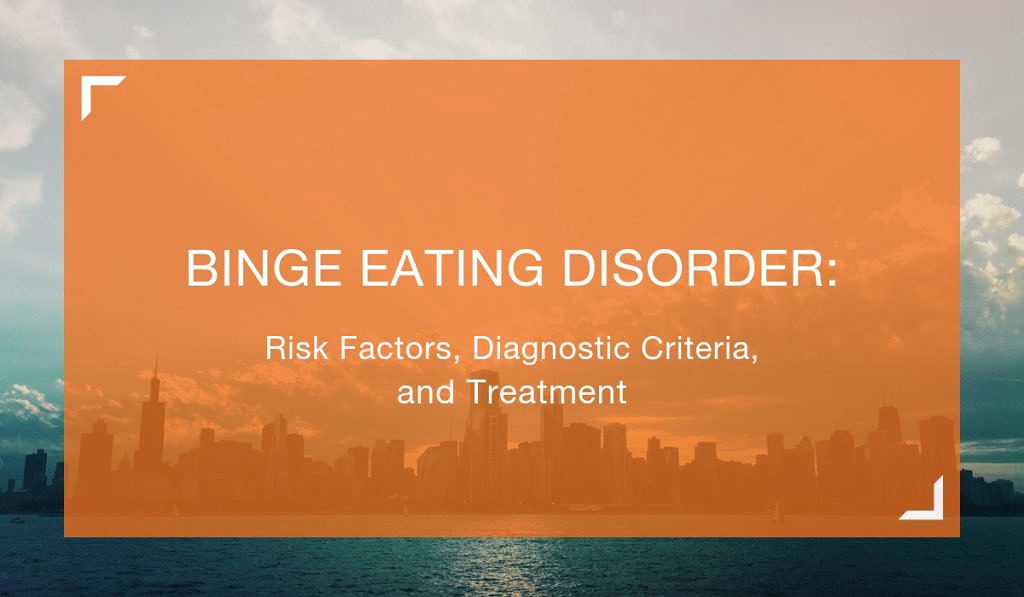Binge Eating Disorder: Risk Factors,
Diagnostic Criteria, and Treatment

Characterized by frequent episodes of excessive overeating that bring about feelings of distress and shame4, binge eating disorder is a public health concern. A 2013 Harvard Medical School study in the journal Biological Psychiatry conducted a survey with respondents from 14 different countries to determine the prevalence of binge eating disorder. They found that binge eating disorder was more common than bulimia nervosa, with a lifetime prevalence of 1.4 percent for binge eating disorder compared to .8 percent for bulimia nervosa1.
Scientists and public health experts have conducted research on binge eating disorder to determine its characteristics and risk factors, to assess the medical and psychiatric conditions associated with it, and to uncover information regarding effective treatment options for this eating disorder.
The Characteristics of Patients with Binge Eating Disorder

There are several differing characteristics among patients with a binge eating disorder.
Relationship to Obesity
Diagnostic Criteria for Binge Eating Disorder





According to the Diagnostic and Statistical Manual of Mental Disorders binge eating disorder is characterized by episodes during which a person eats significantly more than the typical person would eat during a given time period.
Feelings Experienced During Binge Episodes
During these episodes, the person feels as if he or she cannot control the amount of food consumed; the episodes also involve conditions including eating more quickly than normal, concealing the amount of food consumed because of embarrassment, and feeling ashamed or depressed after eating. Binge eating disorder involves not only consuming an excessive amount of food, but also the experience of feelings of depression and shame linked to the overeating.
Regular Bingeing
To meet full criteria for binge eating disorder, a person must demonstrate apparent distress regarding the binge eating and engage in episodes of binge eating at least once per week for a period of three months. Occasional episodes of overeating do not constitute binge eating disorder, as the Diagnostic and Statistical Manual of Mental Disorders specifies that the bingeing must occur at least once per week for an individual to meet diagnostic criteria.
The binge eating episodes cannot regularly involve compensatory actions, such as exercising to burn excess calories, as is seen with bulimia nervosa.
Comparisons to Anorexia and Bulimia





Binge eating disorder is a distinct condition that is separate from anorexia and bulimia, but may share some characteristics with these disorders. In 2000, researchers from San Diego State University, Yale University, Brown University, and Oxford University conducted research that compared individuals with binge eating disorder to those with anorexia and bulimia as well as control groups.
The study’s results, published in the International Journal of Eating Disorders, found that participants with binge eating disorder scored similarly on the Eating Disorders Examination to patients with anorexia and bulimia. Specifically, patients with binge eating disorder were preoccupied with weight and body shape, and they found both weight and body shape to be a critical part of their self-evaluation. Furthermore, patients with binge eating disorder displayed more psychopathology related to disordered eating when compared to overweight individuals who served in the control group5.
Differences from Bulimia and Anorexia
Much like anorexia and bulimia, binge eating disorder involves psychopathology and is accurately classified as a mental disorder. However, it differs from bulimia, as it does not involve compensatory behaviors, such as purging or exercising excessively to burn calories, and it is distinct from anorexia, which involves restrictive eating behaviors and a low body weight, according to the Diagnostic and Statistical Manual of Mental Disorders.
Comorbid Disorders





Physical Health Concerns
The complications associated with binge eating disorder extend beyond psychopathology, as it can also cause physical health problems. A 2017 study in Eating and Weight Disorders-Studies on Anorexia, Bulimia and Obesity analyzed the results of the existing research with binge eating disorder6. Results indicated that binge eating disorder is linked to:
- Diabetes
- High blood pressure
- Abnormal cholesterol levels
- Sleep disorders
- Metabolic syndrome
- Asthma
- Gastrointestinal problems
- Menstrual and pregnancy complications
- Polycystic ovarian syndrome
Mental Health Concerns
In addition to the physical health complications seen with binge eating disorder, individuals with this condition are also at increased risk for experiencing other mental health disorders. A study in a 2009 edition of the International Journal of Eating Disorders analyzed the prevalence of psychiatric disorders among patients with binge eating disorder. The authors of the study with the Yale University School of Medicine found that nearly three-fourths of the patients with binge eating disorder had experienced another mental health disorder at some point during their lives. 43 percent of participants in the study had another mental health diagnosis at the time. The most common mental health conditions among people struggling with binge eating disorder include:
- mood disorders
- anxiety disorders
- substance abuse disorders
Patients who had a mental health diagnosis at the time of the study also demonstrated lowers levels of self-esteem and greater eating disorder pathology7. Binge eating disorder appears to have a strong link to other psychiatric conditions.
Risk Factors for Binge Eating Disorder


Individuals with binge eating disorder are likely to experience comorbid mental and physical health conditions, and there are certain risk factors that can increase a person’s chance of developing binge eating disorder.
A 2005 study in Psychological Medicine discovered that ethnicity was not linked to eating disorder risk8. However, the study results showed that compared to women with another psychiatric conditions, those with binge eating disorder were more likely to:
- have been obese as children
- have experienced overeating or binging within their families
- have been exposed to family conflict or demanding parents
The experiences that people have in childhood can play a significant role in the development of binge eating disorder
Risk Factors Compared to Anorexia Nervosa and Bulimia Nervosa
Additional research has explored the risk factors for binge eating disorder, comparing these risk factors to those associated with other eating disorders, including anorexia and bulimia. The study, published in 2017 in the Journal of Abnormal Psychology, evaluated risk factors for eating disorders among a group of young women who were not satisfied with their bodies.
The study found that after three years, there was an increased risk in developing eating disorders, including binge eating disorder, purging disorder, and bulimia nervosa in women who:
- experienced negative emotions
- engaged in overeating or dieting
- received mental health services
- idealized thinness
Individuals who were naturally lean were more likely to develop anorexia nervosa throughout the course of the study9. These results suggest that binge eating disorder shares risk factors with bulimia and purging disorder but may have different risk factors when compared to anorexia.
Binge Eating Disorder Treatment


Pharmacalogical Options
In 2017, scientists from the Department of Medical Epidemiology and Biostatistics in Stockholm, Sweden, and the University of North Carolina Chapel Hill evaluated the results of nearly 30 studies that assessed the effectiveness of various treatment options for binge eating disorder. These scientists discovered that a stimulant medication called lisdexamfetamine was superior to antidepressants for preventing binge eating.
Cognitive Behavioral Therapy
The study also found that cognitive behavioral therapy was more effective than behavioral weight loss programs for decreasing the occurrence of binge eating episodes10.
Getting Treatment
The study also found that cognitive behavioral therapy was more effective than behavioral weight loss programs for decreasing the occurrence of binge eating episodes10.
Doctor's Referral
Treatment is important for people suffering from binge eating disorder. Medical and mental health professionals should be provided with training, so they are prepared to identify people who are at risk for this condition, as well as those suffering from it, in order to make referrals to appropriate resources or treatment providers.
A Common Concern
As research has shown, binge eating disorder is even more common than bulimia nervosa, making it a relatively prevalent eating disorder and a threat to public health. Individuals who are diagnosed with binge eating disorder are likely to experience other physical and mental health conditions, including diabetes, sleep disorders, and mood and anxiety disorders. While binge eating disorder is associated with obesity, the emotional and metal aspects separates individuals with binge eating disorder from obese individuals without the disorder.
Recovery From Binge Eating Disorder Is Possible
It is therefore important that patients struggling with binge eating disorder receive quality treatment so they can achieve optimal functioning and restore their health and wellness. Treatment can be effective and can result in positive changes.
Sources:
- The Prevalence and Correlates of Binge-Eating Disorder in the WHO World Mental Health Surveys
- Gender Difference in the Prevalence of Eating Disorder Symptoms
- Prevalence and Correlates of Binge-Eating Disorder in a Community Sample
- Diagnostic and Statistical Manual of Mental Disorders, Fifth Edition
- Using the Eating Disorder Examination to Identify the Specific Psychopathologyof Binge-Eating Disorder
- Medical Comorbidity of Binge-Eating Disorder
- DSM-IV Psychiatric Disorder Comorbidity and its Correlates in Binge-Eating Disorder
- Toward an Understanding of Risk Factors for Binge-Eating Disorder in Black and White Women: A Community-Based Case-Control Study
- Risk Factors That Predict Future Onset of Each DSM-5 Eating Disorder: Predictive Specificity in High-Risk Adolescent Females
- Comparative Effectivenness of Treatments for Binge-Eating Disorder: Systematic Review and Network Meta-Analysis
